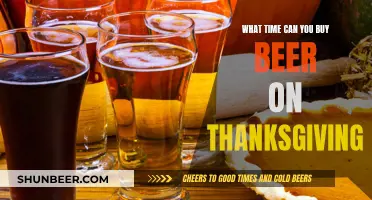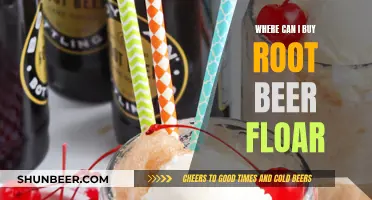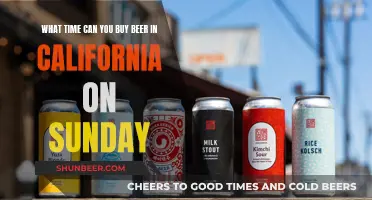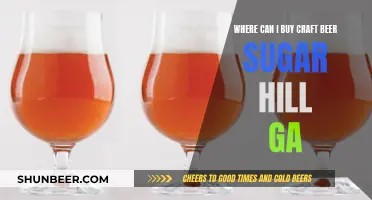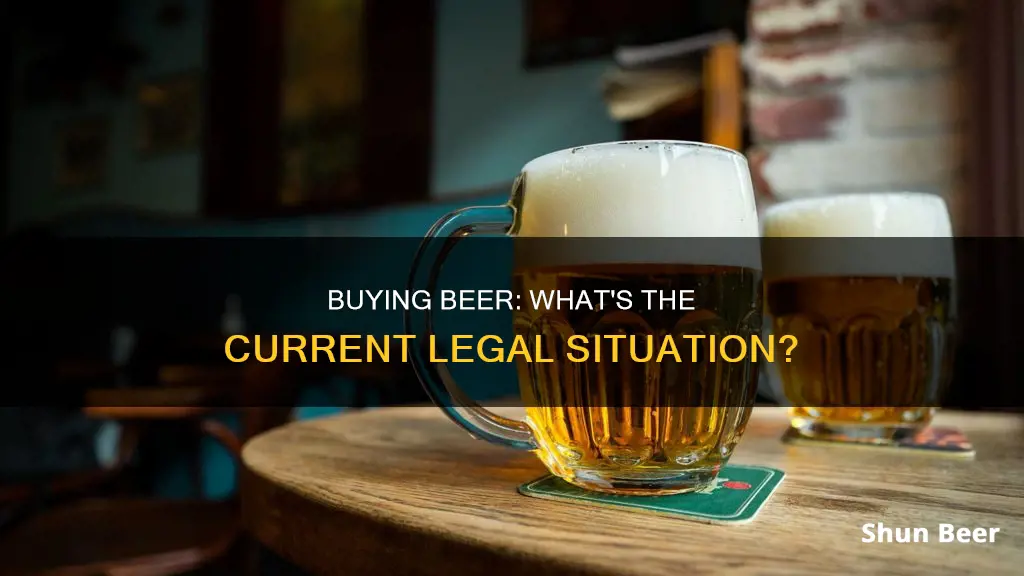
The ability to buy beer depends on where you live and the local laws. In the United States, for example, the minimum drinking age is 21, and each state has its own liquor laws. Texas, for instance, allows the sale of beer and wine from 10 a.m. on Sundays, while liquor is prohibited on that day. In New York, beer can be purchased 24 hours a day, seven days a week, while wine and liquor sales are restricted to specific hours and days. Colorado has imposed a last call at 10 p.m., prohibiting bars and restaurants from serving alcohol for in-person consumption after that time, but allowing liquor and grocery stores to continue selling until midnight. Alabama has a unique set of laws, with a 6% ABV cap on beer sales and a ban on homebrewing.
| Characteristics | Values |
|---|---|
| State | Alabama |
| ABV cap on beer sales | 6% |
| Bottle size limit | 16oz |
| ABV limit on wine | 14.9% |
| Alcohol service hours | 24hrs unless restricted by local ordinances |
| Dry counties | 26 of 67 |
| On and off-premise liquor sales hours | 2 A.M. on Sundays |
| Beer and wine sales in supermarkets | Allowed |
| Spirits sales in supermarkets | Not allowed |
| Homebrewing | Illegal |
What You'll Learn

Beer can be purchased in grocery stores in some states, but not all
In Florida, beer, wine, and low alcohol liquors can be purchased at grocery stores, but spirits greater than 76.5% ABV are illegal. In Georgia, there are no Sunday off-premise sales. In Hawaii, beer, wine, and spirits can all be sold in grocery stores. Idaho is similar, with beer and wine sold in grocery stores, and higher-ABV beverages sold in state-controlled stores. Illinois also allows all beverages to be sold in grocery stores. Indiana and Iowa also permit the sale of alcohol in supermarkets.
Kansas only allows 3.2% ABV beer to be sold in grocery stores. Kentucky allows beer to be sold in grocery stores, but there are still many dry counties where alcohol possession is illegal. Louisiana has no restrictions on off-premise sales, and alcohol can be sold in grocery stores and all other licensed stores. Maine allows beer and wine to be sold in grocery stores, with higher-ABV wine sold in state-controlled stores. Maryland has varying laws by locality, with some counties prohibiting Sunday sales and others allowing alcohol to be sold in grocery stores.
Massachusetts does not allow grocery stores to sell beer, wine, or spirits, but some convenience stores are licensed to sell beer. In Michigan, all liquor can be sold at grocery stores and convenience stores, except gas stations in Wayne County. Minnesota does not allow off-premise sales on Sundays, and beer can be sold in grocery stores. Mississippi also only allows beer to be sold in grocery stores, with wine sold in state-controlled stores. Missouri has very permissive alcohol laws, with all forms of alcohol sold in grocery stores and no dry counties.
Montana allows beer and wine to be sold in grocery stores, with higher-ABV wine sold in state-controlled stores. Nebraska allows all alcohol to be purchased in grocery stores, but not on Sundays before noon. Nevada has very few alcohol laws, and liquor can be sold in grocery and convenience stores. New Hampshire only allows beer to be sold in grocery stores, with a 12% ABV cap. New Jersey has some dry counties, and beer and wine can occasionally be sold in grocery stores. New Mexico allows alcohol to be sold in grocery stores, with some restrictions on Sunday sales.
New York allows 24-hour beer sales in grocery stores, with wine and spirits sold from 8 am to midnight on weekdays and 12 pm to 9 pm on Sundays. North Carolina has a 15% ABV cap on beer sold in grocery stores, with liquor sold in state-run stores. North Dakota allows off-premise sales until 2 am, with beer sold in grocery stores. Ohio allows all forms of alcohol to be sold in grocery stores. Oklahoma only allows 3.2% ABV beer to be sold in supermarkets, with higher-ABV beer sold in liquor stores, which are closed on Sundays. Oregon allows beer and wine to be sold in supermarkets, with liquor sold in state-run stores.
Pennsylvania only allows wine and spirits to be sold in state-run stores, and beer can be sold in grocery stores. Rhode Island only allows alcohol to be sold in liquor stores, so it cannot be purchased in supermarkets. South Carolina has a 14% ABV cap on beer sold in grocery stores, with no liquor sales on Sundays. South Dakota permits the sale of alcohol in supermarkets. Tennessee allows beer to be sold in supermarkets, with higher-ABV beer sold in liquor stores. Texas allows beer and wine to be sold in supermarkets, with liquor sold in liquor stores, which are closed on Sundays.
Utah has strict alcohol laws, with only 3.2% ABV beer sold in supermarkets. Vermont allows beer and wine to be sold in supermarkets, with liquor sold in state-run stores. Virginia allows beer and wine to be sold in supermarkets, with higher-ABV wine sold in state-run stores. Some counties in Virginia prohibit Sunday sales. Washington allows beer and wine to be sold in supermarkets, with liquor sold in state-run stores. West Virginia allows beer and wine to be sold in supermarkets, with a 6% ABV cap on beer. Wisconsin allows alcohol to be sold in supermarkets, with minors permitted to consume when supervised by a parent or guardian. Wyoming only allows alcohol to be sold in liquor stores.
Best Places to Buy Medalla Beer
You may want to see also

Alcohol sales are prohibited on Sundays in some states
Alcohol sales are prohibited on Sundays in some US states due to the existence of "blue laws", which are laws that restrict or ban certain activities on specified days, most often Sundays. These laws are in place to promote the observance of a day of rest and are enforced in parts of the United States, Canada, and some European countries. While most blue laws have been repealed in the US, many states continue to impose tighter restrictions on the sale of alcoholic drinks on Sundays.
- Alabama: On-premise and off-premise liquor sales are limited to 2 AM on Sundays. Twenty-six of Alabama's 67 counties do not allow any alcohol to be sold, although possession and consumption are still legal.
- Arkansas: Arkansas has many dry counties, but private clubs are exempt. Sunday and Christmas Day sales are prohibited.
- Connecticut: Off-premise sales of alcohol are not allowed on Sundays or holidays.
- Georgia: No Sunday off-premise alcohol sales are permitted.
- Indiana: There are no off-premise alcohol sales on Sundays.
- Kansas: Sunday sales have only been allowed since 2005. In counties that allow on-premise sales, off-premise sales are prohibited on Sundays.
- Kentucky: While Sunday sales are allowed, they can be overruled locally. Fifty-three counties are completely dry, and alcohol possession is illegal.
- Maryland: Some counties prohibit alcohol sales on Sundays.
- Massachusetts: Off-premise sales on Sundays start at noon.
- Mississippi: In most counties, Sunday sales are prohibited.
- North Carolina: There are no alcohol sales between 2 AM and 7 AM on Sundays.
- Oklahoma: Off-premise sales are not allowed on Sundays.
- Tennessee: Off-premise sales are not allowed on Sundays.
- Texas: Liquor stores are closed on Sundays.
- Utah: Off-premise sales vary but are not available on Sundays.
- Virginia: Sunday sales are prohibited in some counties.
- West Virginia: On-premise sales are prohibited from 12:01 AM to 6 AM on Sundays.
It is important to note that laws regarding alcohol sales, including Sunday prohibitions, can vary by county and municipality within a state. Additionally, blue laws are gradually being phased out, with more states relaxing their restrictions over time.
Indio Beer: Where to Buy and Try This Brew
You may want to see also

Some states have ABV limits on beer
The United States Constitution grants each state and territory the power to regulate intoxicating liquors within their jurisdiction. As a result, laws pertaining to the production, sale, distribution, and consumption of alcohol vary significantly across the country.
Some states have set ABV limits on beer, and these vary from state to state. For example, Utah and Colorado limit beer to 4% ABV, while Vermont allows up to 16% ABV. North Carolina, South Dakota, and Georgia also have high ABV limits at 15%, 14%, and 14%, respectively.
In addition to setting maximum ABV limits, some states also impose other restrictions on beer sales. For instance, Alabama has a 6% ABV cap on beer sales, and bottles cannot exceed 16 ounces. Similarly, Ohio has a 12% ABV cap on beer, and only allows the sale of beer with an ABV of 5% or lower in grocery stores. On the other hand, some states, like California, set a minimum ABV limit of 76.5% for the sale of alcohol.
These ABV limits can have an impact on the types of beer available in different states and may influence consumer preferences. However, it is worth noting that culture and societal factors, such as religious beliefs, also play a significant role in shaping alcohol consumption patterns.
Ginger Beer Brand Crabbies: Where to Buy?
You may want to see also

In some states, liquor can only be purchased at liquor stores
The ability to buy beer and other alcoholic beverages varies from state to state in the United States. Each state has its own rules and regulations regarding the sale and consumption of alcohol. In some states, beer and wine can be purchased in grocery stores, while in others, they can only be bought at liquor stores.
In Alabama, for example, beer and wine are not controlled by the state, but spirits are. On and off-premise liquor sales are limited to 2 a.m. on Sundays, and beer and wine can be sold in supermarkets, but spirits cannot. Twenty-six of Alabama's 67 counties do not allow the sale of alcohol, but possession and consumption are still legal.
In contrast, Alaska has no state control over alcohol sales, and liquor sales are permitted from 8 a.m. to 5 a.m. However, liquor sales are not allowed in grocery stores.
Some states, like Arizona, have drive-through liquor stores and no restrictions on the days of the week that alcohol can be sold. Arizona also has some of the most lenient laws regarding liquor promotion.
Other states, like Arkansas, have more complicated laws. On-premise sales hours vary depending on the type of establishment, and off-premise sales are only allowed until midnight on Saturdays. While beer and wine can be sold in supermarkets, only in-state-produced wine is permitted, and spirits are not. Additionally, Arkansas has
Buying Beer at Jack Trice Stadium: What You Need to Know
You may want to see also

Alcohol sales are prohibited on certain holidays
Arkansas
Arkansas has 39 "dry" counties out of 75 where the sale of alcohol is banned. Alcohol sales are prohibited on Christmas Day, even in private facilities. Alcohol sales are also generally prohibited on Sundays.
Connecticut
Connecticut repealed its ban on Sunday alcohol sales in 2012.
Delaware
In Delaware, alcohol sales are prohibited on Thanksgiving, Christmas, and New Year's Day. Alcoholic liquor can only be sold in specific establishments between 9 am and 1 am.
Florida
Some counties in Florida prohibit alcohol sales on Sundays and during certain hours of the day.
Illinois
Illinois prohibits horse racing on Sundays unless authorized by the local municipality. Car dealerships are closed on Sundays.
Indiana
Indiana restricts Sunday alcohol sales to between noon and 8 pm. Alcohol sales are also prohibited on Christmas.
Kansas
Kansas has strict alcohol regulations, with sales prohibited on Memorial Day, Labor Day, Independence Day, Thanksgiving, Christmas, and Easter.
Maine
In Maine, it is illegal for most businesses to be open on Thanksgiving, and hunting is prohibited on Sundays.
Maryland
Maryland law restricts professional sports games from being played before 1 pm on Sundays. Additionally, car dealerships are prohibited from selling or offering vehicles for sale on Sundays, except in certain counties.
Michigan
In Michigan, it is illegal to buy, sell, or trade motor vehicles on Sundays.
Minnesota
Liquor stores in Minnesota that choose to operate on Sundays can only do so between 11 am and 6 pm. Car dealerships are also closed on Sundays.
Mississippi
Mississippi prohibits the sale of alcohol on Sundays statewide.
Nevada
Nevada residents cannot purchase vehicles or water their grass on Sundays.
New Jersey
Bergen County in New Jersey has one of the few remaining Sunday closing laws, prohibiting the sale of electronics, clothing, and furniture on Sundays. Paramus, a town within Bergen County, has even stricter laws, banning all types of work on Sundays except for essential services.
New Mexico
Alcohol sales are prohibited on Sundays and Christmas Day in New Mexico.
New York
In New York, alcohol can start being served on Sundays at 10 am due to the "Brunch Bill" introduced in 2016. Certain New York counties have their own separate blue laws.
North Carolina
North Carolina prohibits alcohol sales between 2 am and 7 am from Monday to Saturday, and between 2 am and either 10 am or 12 pm on Sundays, depending on the county.
Oklahoma
Oklahoma prohibits alcohol sales on New Year's Day, Memorial Day, Independence Day, Labor Day, Thanksgiving, and Christmas Day. Car dealerships are also closed on Sundays.
Pennsylvania
Pennsylvania prohibits hunting on Sundays, except for certain types of game. Car dealerships are also closed on Sundays.
Tennessee
Tennessee prohibits the consumption of alcohol on-premise between 3 am and 10 am on Sundays, unless extended hours have been approved by the local government.
Texas
Texas law states that car dealerships must close on either Saturday or Sunday, with the option to choose which day. Alcohol sales are prohibited on New Year's Day, Thanksgiving, and Christmas, as well as between 9 pm and 10 am daily.
Buying Beer in Michigan: Early Morning Shopping Laws
You may want to see also
Frequently asked questions
Yes, beer and wine are not controlled by the state of Alabama. However, there is a 6% ABV cap on beer sales, and bottles cannot exceed 16oz.
Yes, Texans can buy beer and wine on Sundays starting at 10 a.m. Beer can be sold off-premise from 7 a.m. to midnight Monday to Friday, 7 a.m. to 1 a.m. on Saturday, and from noon to midnight on Sunday.
Yes, beer can be sold 24 hours a day in New York, both during the week and on Sundays.
Yes, you can buy beer in Colorado at grocery and liquor stores until midnight. However, 'on-premise' consumption at bars and restaurants must stop at 10 p.m.
Yes, beer can be sold in Arizona from 6 a.m. to 2 a.m. seven days a week.


